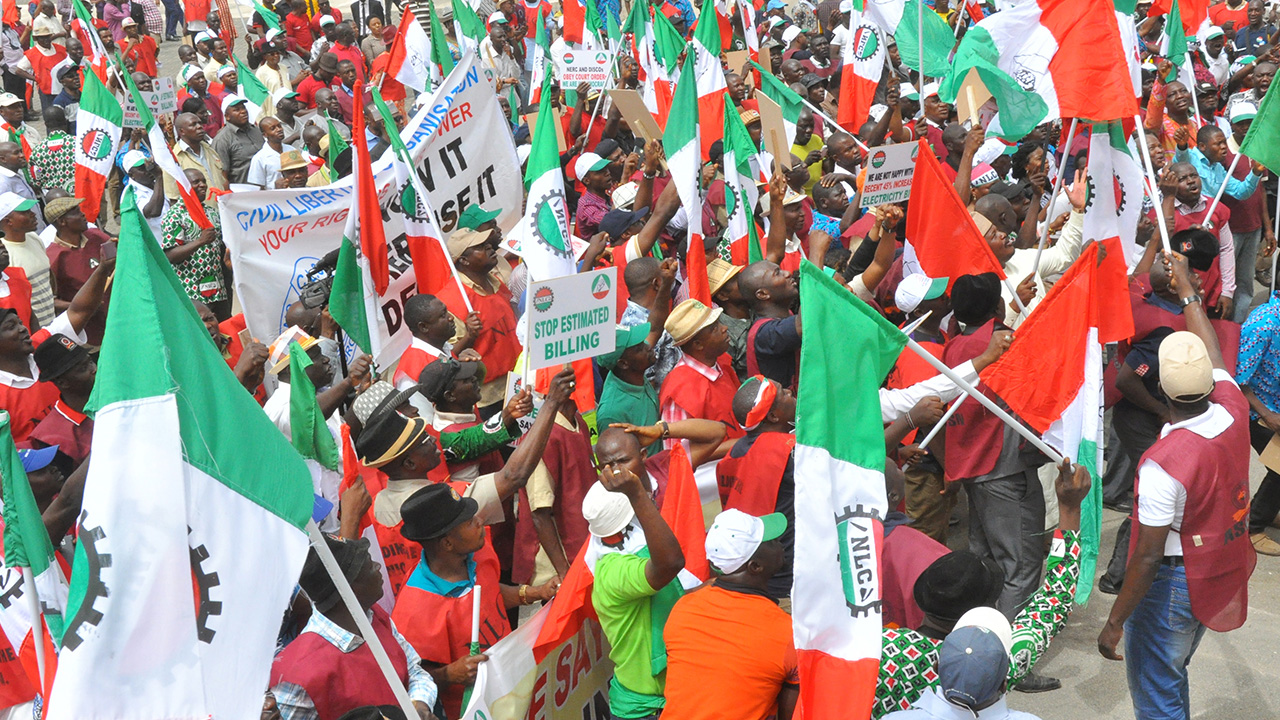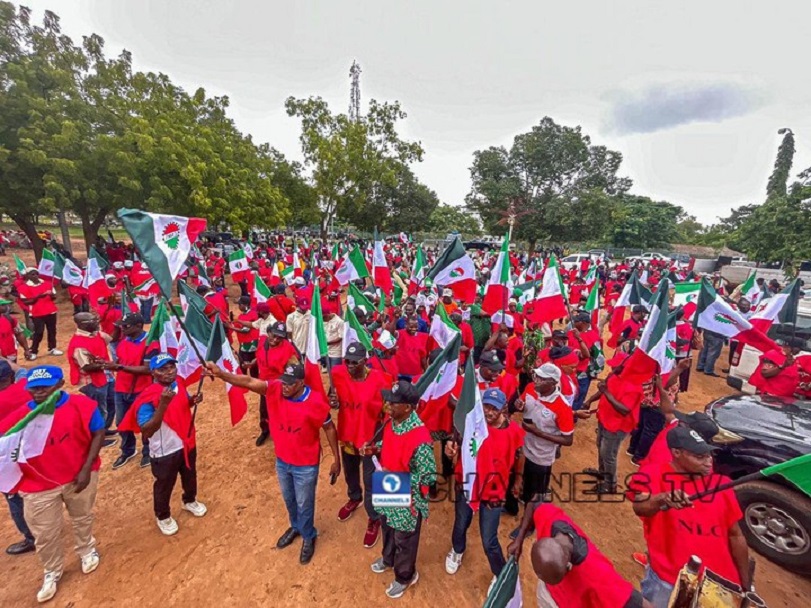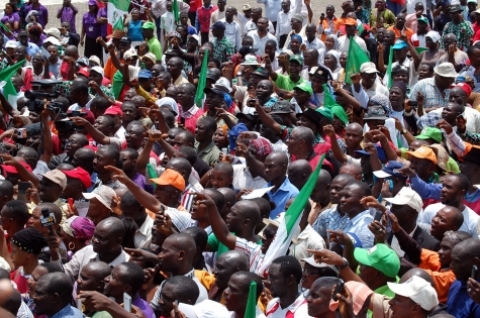Jobs/Appointments
Recession a Huge Blow on Nigerian Workers—Union Leader

By Ahmed Rahma
The second slip of Nigeria into a recession in over four years has been described as a huge blow on the Nigerian workers, who are still struggling with the effect of COVID-19 pandemic.
But in order to quicken the lifting of the poor out of crushing weight of the consequences of the economic crisis, the federal government must embark on aggressive relief programmes.
These are the views of the vice chairperson of the National Women Commission (NWC) of the Nigeria Labour Congress (NLC), Ms Hadiza Ali.
On Saturday, the National Bureau of Statistics (NBS) released a report which said the Gross Domestic Product (GDP) of the country declined in the third quarter of this year as oil production dropped to a four-year low.
In the report signed by the Statistician-General, Mr Yemi Kale, the country’s economy shrank by 3.6 per cent from July to September, noting that it was the second successive decline in the GDP as in the second quarter of 2020, it contracted by 6.1 per cent, indicating a recession.
“It is really sad that Nigeria’s economy has gone into recession coupled with hardship brought about by the COVID-19 pandemic lock-down that has brutally become sad tale of workers, middle income and low income earners,” the labour union leader said.
“As it is, the effect and impact of the COVID-19 pandemic has wreaked untold havoc on the Nigerian workers and now with the economy plunging into recession means a double blow on the Nigerian workers.
“The impact of the recession on the Nigerian workers is that there will not be enough money in their pockets, especially with the effect of the removal oil subsidy, which has resulted in the increase of the pump price of fuel and has caused the escalation of costs of transportation, food commodities and other means of livelihood,” Ms Ali stated.
She said an increase in the rate of inflation will take out more money from the pockets of worker in meeting up with basic expenditure; cost of running businesses, production and services.
Ms Ali also stated that women empowerment will suffer a serious blow and set back, especially those in the informal sector, who run small businesses and rely on daily income.
“And for the likes of food vendors and others, the recession may affect their businesses due to the cost of inflation because the price of food stuff and other items will be extremely high and they may find it difficult to continue in business, which means they will not contribute to the GDP,” the comrade, who is also a lawyer, said.
Jobs/Appointments
NMDPRA Denies Fake Employment Alert, Warns Unsuspecting Job Seekers

By Adedapo Adesanya
The Nigerian Midstream and Downstream Petroleum Regulatory Authority (NMDPRA) has clarified that the viral report suggesting that it is currently employing new staff is the “handiwork of fake recruitment syndicates established to mastermind fraudulent activities.”
In a Monday statement posted on its official X handle, NMDPRA expressed that it was compelled to publish the disclaimer to alert the public against such activities due to what it described as “exploiting young economically vulnerable and unsuspecting Nigerians perhaps into parting with huge sums of money for purported employment opportunities into the authority.”
“They do this by issuing bogus “Letters of Employment” and empty promises, as well as offering non-existent positions. These may well be the handiwork of fake recruitment syndicates established to mastermind these fraudulent activities.
“We wish to use this opportunity to state categorically that the NMDPRA is NOT conducting any recruitment exercise currently. Neither is the Agency undertaking any kind of employment in its services at any level. For the avoidance of doubt, any future recruitment exercise would be undertaken in accordance with extant rules guiding such exercises in the Nigerian Public Service,” the organisation emphasised.
The agency further advised the public to disregard these fake employment advertisements and urged them to visit its official website and social media pages to verify any recruitment claims.
The statement added, “In this regard therefore, we would like to advise the public and all Nigerians to ignore these spurious claims by unscrupulous people whose only objective is to defraud Nigerians and cast aspersion on the authority.
“We further advise that for current and up to date information regarding all our activities, kindly refer to our official corporate website: www.nmdpra.gov.ng as well as all our verified online social media outlets (i.e. Facebook, Linkedln and Instagram) for authentic information.”
Jobs/Appointments
Aradel Appoints Nnoli Akpedeye as Independent Non-Executive Director

By Adedapo Adesanya
Aradel Holdings Plc has appointed Ms Nnoli Akpedeye as an Independent Non-Executive Director, effective February 2, 2026, following a resolution passed at the company’s board meeting held on January 28, 2026.
In a notice to shareholders, Nigerian Exchange (NGX) Limited, and the investing public, the company disclosed that the appointment is subject to ratification by shareholders at its next Annual General Meeting (AGM). The board also authorised the Company Secretary, Mrs Titiola Omisore, to notify relevant regulators and take all necessary steps to give effect to the decision.
Ms Akpedeye brings more than 36 years of multi-disciplinary experience spanning oil and gas, engineering, legal and arbitration services, and management consulting. Her career reflects a strong blend of technical expertise and strategic leadership, with competencies in management and strategy, business process engineering, organisational development and change management, as well as entrepreneurship development.
Until 2014, she served as Technical Planning Manager for Shell Exploration and Production Companies in Nigeria, where she led the execution of high-impact, mission-critical projects. Over the course of her career at Shell, she held roles across civil engineering design, planning and construction, project management, facility management, technical audit, and business planning and strategy, gaining extensive local and international exposure.
Beyond her corporate career, Ms Akpedeye is an entrepreneur and advocate for capacity building in engineering and energy. She runs Contego Servo Limited and Perfectus Laundi Limited, and in 2013, she launched the “Introduce a Girl to Engineering” programme aimed at encouraging secondary school girls in Nigeria to pursue careers in engineering and related STEM fields.
She is a Council for the Regulation of Engineering in Nigeria (COREN)-registered engineer, a Fellow of the Nigerian Society of Engineers (FNSE), and a past President of the Association of Professional Women Engineers of Nigeria (APWEN). She is also a founding member of the Women in Energy Network (WIEN) and serves as a passionate ambassador for science, technology, engineering and mathematics education.
In addition, Ms Akpedeye is the Chief Operating Officer (COO) of Compos Mentis Legal Practitioners and the Chairman of the Board of Trustees of the Compos Mentis Foundation.
Her appointment further strengthens Aradel Holdings’ board with deep industry knowledge, governance experience, and a strong track record in leadership and institutional development, as the company continues to pursue its strategic objectives within Nigeria’s energy landscape.
Jobs/Appointments
Geregu Power Chooses Sean Manley as Interim CEO

By Aduragbemi Omiyale
An interim chief executive has been appointed by Geregu Power Plc and he is Mr Sean Manley, with his appointment to take effect from Monday, February 2, 2026.
A statement from the power generating firm disclosed that his appointment is subject to the approval of the Nigerian Electricity Regulatory Commission (NERC) and the shareholders of the company at the next general meeting.
In the notice, the organisation expressed confidence that the appointee would use his wealth of experience and leadership to “add significant value to the company.”
Mr Manley is said to be “a seasoned power-sector professional with a proven track record in delivering complex energy projects in developing markets.”
He is armed with more than 30 years’ experience spanning sales, business development, project implementation, supply-chain management, and OEM-led delivery within the power sector.
Over the course of his career with Siemens, Mr Manley has developed deep technical and operational expertise in thermal power generation, covering plant construction, commissioning, major overhauls, and long-term operational support.
He is widely regarded as a practical problem-solver, with a demonstrated ability to close projects in challenging operating environments and brings extensive international experience and strong intercultural skills acquired across multi-jurisdictional engagements.
His areas of expertise include the delivery of large, complex infrastructure projects, management of multi-million-dollar business units, client and stakeholder relationship management, business and market development, as well as logistics and procurement analysis critical to successful project execution.
The appointment of Mr Manley comes after Mr Femi Otedola divested his stake in the energy firm last month to support the recapitalisation of First Bank of Nigeria, a subsidiary of FBN Holdings Plc, which he chairs.
-

 Feature/OPED6 years ago
Feature/OPED6 years agoDavos was Different this year
-
Travel/Tourism9 years ago
Lagos Seals Western Lodge Hotel In Ikorodu
-

 Showbiz3 years ago
Showbiz3 years agoEstranged Lover Releases Videos of Empress Njamah Bathing
-

 Banking8 years ago
Banking8 years agoSort Codes of GTBank Branches in Nigeria
-

 Economy3 years ago
Economy3 years agoSubsidy Removal: CNG at N130 Per Litre Cheaper Than Petrol—IPMAN
-

 Banking3 years ago
Banking3 years agoSort Codes of UBA Branches in Nigeria
-

 Banking3 years ago
Banking3 years agoFirst Bank Announces Planned Downtime
-

 Sports3 years ago
Sports3 years agoHighest Paid Nigerian Footballer – How Much Do Nigerian Footballers Earn


















